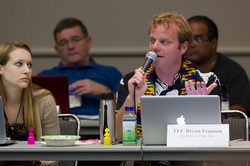With a packed committee room and an overflowing list of would-be speakers, it was clear not every one who wanted to would be able to address the controversial recommendations facing the Middle East Issues committee of the 221st General Assembly (2014) of the Presbyterian Church (U.S.A.).
But those who were heard during an hour-long open hearing Monday represented the breadth of opinions about what the denomination should do about various proposals dealing with the region.
Most of the speakers addressed an overture from the Presbytery of New Covenant calling for a two-state solution and rejecting divestment and economic sanctions. The overture also calls for Presbyterians to engage in interfaith dialogue and travel to the Holy Land and urges church institutions to consider “investments in Israel-Palestine that advance peace and improve the lives of Palestinians and Israelis.”
Mark Boyd, a teaching elder from Presbytery of Beaver-Butler, spoke in favor of the overture, recalling a trip to Israel/Palestine, where he found himself reflecting on the parable of the Good Samaritan, in which the Samaritan invested in someone else’s life.
“The only way to help someone 6,000 miles away is to continue investing from afar,” Boyd said.
Speaking against the overture was Stefanie Fox, co-director of organizing for Jewish Voice for Peace, a Jewish social justice group.
As a Jew, Fox believes all lives are precious and that people have an obligation to stand up against oppression.
“There’s nothing Jewish about a family weeping next to their home demolished by a Caterpillar bulldozer,” she said. “Therefore, there’s nothing anti-Jewish about ending your complicity in these crimes.”
Four of the nine overtures before the committee recommend divesting from some combination of Caterpillar, Inc., Hewlett-Packard and Motorola Solutions — companies they say are engaged in “non-peaceful pursuits” in Israel/Palestine.
The Committee on Mission Responsibility Through Investment recommends divesting from those three companies, and some speakers addressed an overture supporting that recommendation.
Speaking in favor of the overture was Jessie Light from Presbytery of Heartland. She traveled to Israel/Palestine in January and met a family whose farm was destroyed by Caterpillar bulldozers.
“If we truly believe in peace and justice and the power of God’s love to bring us together, we must be bold,” she said.
Katharine Henderson, president of Auburn Theological Seminary, spoke against the overture. She has been active in interfaith dialogue and believes that boycotts, divestment or sanctions will not stop the conflict and will actually delay peace. Rather, the answer will come from investments in the economy and in relationships, she said.
The committee approved two overtures: one supporting the establishment and protection of human rights of all inhabitants of Israel and the occupied territories (04-09) and one affirming investments in the West Bank that “support the rights under international law of the Palestinian people and contribute to their welfare” (04-06).
However, citing what it said was incendiary and vague language, the committee disapproved an overture calling the Assembly to stand against racism and oppression, oppose anti-Semitism, recognize Israel’s noncompliance with international law, call on the United States to treat Israelis and Palestinians equally and direct Presbyterians to engage in nonviolent actions to bring about reconciliation.

